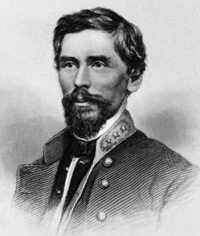Get Today in Masonic History into your Inbox. Sign up today for one of our email lists!
Need an article for your Trestleboard/Newsletter see our Use Policy
Patrick Ronayne Cleburne is Born

Today in Masonic History Patrick Ronayne Cleburne is born in 1828.
Patrick Ronayne Cleburne was an Irish-born Confederate General.
Cleburne was born on March 17th, 1828 in Ovens, County Cork, Ireland. His mother passed away when he was only 18 months old. His father, who was a doctor, passed away when Cleburne was 15. He attempted to follow in his father's footsteps, but was not accepted to the Trinity College of Medicine when he failed the entrance exams.
In 1846, in response to his failure to get into Trinity, Cleburne joined the British Army, rising to the rank of corporal. He bought his discharge in 1849 and with his siblings emigrated to the United States. He spent a brief time in Ohio before moving to and settling in, Helena, Arkansas. He began working for a pharmacist and was quickly welcomed into the local society. In 1855, Cleburne and two friends bought the local paper, The Democratic Star.
The following year, in 1856, Cleburne was shot during a street fight in Helena. Cleburne was shot in the back. He spun and returned fire, killing his assailant. The other attackers hid until Cleburne collapsed in the street when they fled. After Cleburne recovered he was brought before a Grand Jury to respond to charges. All charges against him were dismissed. By 1860 he was a naturalized United States Citizen and was practicing law in town.
As secession grew to a crisis and the Civil War loomed, Cleburne sided with the southern states. Cleburne himself claimed not to care about slavery, it was his affection for the Southern people which led him to take up arms in the Civil War. Cleburne joined a local militia, the Yell Rifles, and was elected captain. He led the company in the seizure of the United States arsenal at Little Rock in 1861. After Arkansas seceded from the Union the Yell Rifles became the 1st Arkansas and then the 15th Arkansas. Cleburne was elected Colonel. In 1862 he was promoted to Brigadier General.
Over the next two years, Cleburne led his men in a variety of battles. At the Battle of Richmond, Kentucky he was wounded when he was struck in the face with a minié ball which tore through his cheek and smashed several teeth. In several battles his unit came to the aid of other units, holding the line, allowing the other unit to withdraw. This earned Cleburne the nickname "Stonewall of the West."
In 1863, it became obvious to Cleburne the war was lost. He saw the biggest issues were a lack of manpower and a lack of resources. In 1864 he called together the leadership of the Tennessee Army in a rather dramatic fashion to propose a radical idea. He proposed they emancipate slaves and enlist them in the Confederate Army. Cleburne felt the war was not about slavery as had been repeatedly stated by Northern forces, it was about the rights and liberties being denied to Southern states by the Union. This idea was met with silence at the meeting. It was never officially recognized by Confederate leadership.
In 1864 at the Battle of Franklin, Cleburne was part of an assault, which he opposed. It was his last time in battle. His body was found inside the Union lines. It is not clear if he was shot in the stomach or through the heart. Either way his wounds were fatal and he passed away on November 30th, 1864.
Cleburne was a member of Lafayette Lodge No. 16 in Helena, Arkansas.
This article provided by Brother Eric C. Steele.

